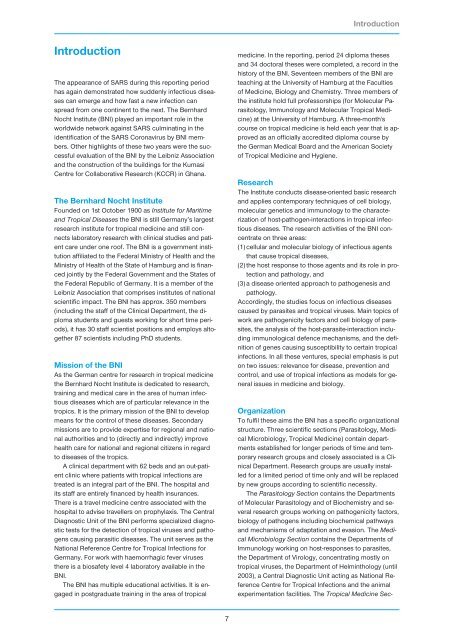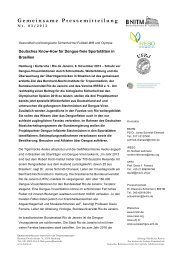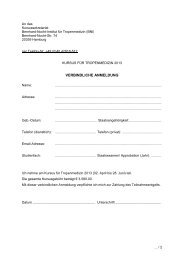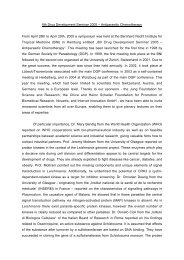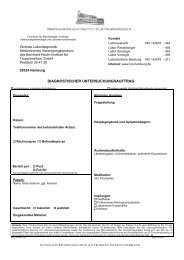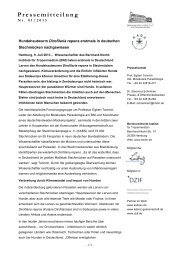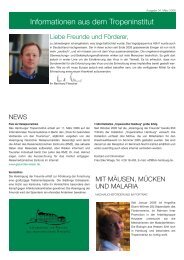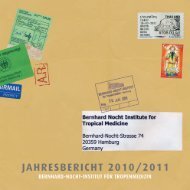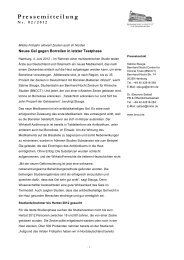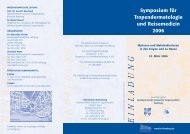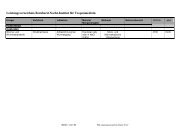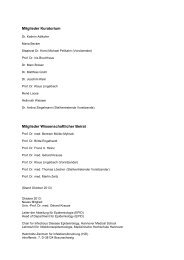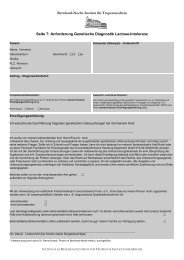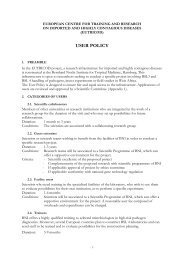Research Group Heussler (Malaria I) - Bernhard-Nocht-Institut für ...
Research Group Heussler (Malaria I) - Bernhard-Nocht-Institut für ...
Research Group Heussler (Malaria I) - Bernhard-Nocht-Institut für ...
Create successful ePaper yourself
Turn your PDF publications into a flip-book with our unique Google optimized e-Paper software.
Introduction<br />
The appearance of SARS during this reporting period<br />
has again demonstrated how suddenly infectious diseases<br />
can emerge and how fast a new infection can<br />
spread from one continent to the next. The <strong>Bernhard</strong><br />
<strong>Nocht</strong> <strong>Institut</strong>e (BNI) played an important role in the<br />
worldwide network against SARS culminating in the<br />
identification of the SARS Coronavirus by BNI members.<br />
Other highlights of these two years were the successful<br />
evaluation of the BNI by the Leibniz Association<br />
and the construction of the buildings for the Kumasi<br />
Centre for Collaborative <strong>Research</strong> (KCCR) in Ghana.<br />
The <strong>Bernhard</strong> <strong>Nocht</strong> <strong>Institut</strong>e<br />
Founded on 1st October 1900 as <strong>Institut</strong>e for Maritime<br />
and Tropical Diseases the BNI is still Germany’s largest<br />
research institute for tropical medicine and still connects<br />
laboratory research with clinical studies and patient<br />
care under one roof. The BNI is a government institution<br />
affiliated to the Federal Ministry of Health and the<br />
Ministry of Health of the State of Hamburg and is financed<br />
jointly by the Federal Government and the States of<br />
the Federal Republic of Germany. It is a member of the<br />
Leibniz Association that comprises institutes of national<br />
scientific impact. The BNI has approx. 350 members<br />
(including the staff of the Clinical Department, the diploma<br />
students and guests working for short time periods),<br />
it has 30 staff scientist positions and employs altogether<br />
87 scientists including PhD students.<br />
Mission of the BNI<br />
As the German centre for research in tropical medicine<br />
the <strong>Bernhard</strong> <strong>Nocht</strong> <strong>Institut</strong>e is dedicated to research,<br />
training and medical care in the area of human infectious<br />
diseases which are of particular relevance in the<br />
tropics. It is the primary mission of the BNI to develop<br />
means for the control of these diseases. Secondary<br />
missions are to provide expertise for regional and national<br />
authorities and to (directly and indirectly) improve<br />
health care for national and regional citizens in regard<br />
to diseases of the tropics.<br />
A clinical department with 62 beds and an out-patient<br />
clinic where patients with tropical infections are<br />
treated is an integral part of the BNI. The hospital and<br />
its staff are entirely financed by health insurances.<br />
There is a travel medicine centre associated with the<br />
hospital to advise travellers on prophylaxis. The Central<br />
Diagnostic Unit of the BNI performs specialized diagnostic<br />
tests for the detection of tropical viruses and pathogens<br />
causing parasitic diseases. The unit serves as the<br />
National Reference Centre for Tropical Infections for<br />
Germany. For work with haemorrhagic fever viruses<br />
there is a biosafety level 4 laboratory available in the<br />
BNI.<br />
The BNI has multiple educational activities. It is engaged<br />
in postgraduate training in the area of tropical<br />
7<br />
Introduction<br />
medicine. In the reporting, period 24 diploma theses<br />
and 34 doctoral theses were completed, a record in the<br />
history of the BNI. Seventeen members of the BNI are<br />
teaching at the University of Hamburg at the Faculties<br />
of Medicine, Biology and Chemistry. Three members of<br />
the institute hold full professorships (for Molecular Parasitology,<br />
Immunology and Molecular Tropical Medicine)<br />
at the University of Hamburg. A three-month's<br />
course on tropical medicine is held each year that is approved<br />
as an officially accredited diploma course by<br />
the German Medical Board and the American Society<br />
of Tropical Medicine and Hygiene.<br />
<strong>Research</strong><br />
The <strong>Institut</strong>e conducts disease-oriented basic research<br />
and applies contemporary techniques of cell biology,<br />
molecular genetics and immunology to the characterization<br />
of host-pathogen-interactions in tropical infectious<br />
diseases. The research activities of the BNI concentrate<br />
on three areas:<br />
(1) cellular and molecular biology of infectious agents<br />
that cause tropical diseases,<br />
(2) the host response to those agents and its role in protection<br />
and pathology, and<br />
(3) a disease oriented approach to pathogenesis and<br />
pathology.<br />
Accordingly, the studies focus on infectious diseases<br />
caused by parasites and tropical viruses. Main topics of<br />
work are pathogenicity factors and cell biology of parasites,<br />
the analysis of the host-parasite-interaction including<br />
immunological defence mechanisms, and the definition<br />
of genes causing susceptibility to certain tropical<br />
infections. In all these ventures, special emphasis is put<br />
on two issues: relevance for disease, prevention and<br />
control, and use of tropical infections as models for general<br />
issues in medicine and biology.<br />
Organization<br />
To fulfil these aims the BNI has a specific organizational<br />
structure. Three scientific sections (Parasitology, Medical<br />
Microbiology, Tropical Medicine) contain departments<br />
established for longer periods of time and temporary<br />
research groups and closely associated is a Clinical<br />
Department. <strong>Research</strong> groups are usually installed<br />
for a limited period of time only and will be replaced<br />
by new groups according to scientific necessity.<br />
The Parasitology Section contains the Departments<br />
of Molecular Parasitology and of Biochemistry and several<br />
research groups working on pathogenicity factors,<br />
biology of pathogens including biochemical pathways<br />
and mechanisms of adaptation and evasion. The Medical<br />
Microbiology Section contains the Departments of<br />
Immunology working on host-responses to parasites,<br />
the Department of Virology, concentrating mostly on<br />
tropical viruses, the Department of Helminthology (until<br />
2003), a Central Diagnostic Unit acting as National Reference<br />
Centre for Tropical Infections and the animal<br />
experimentation facilities. The Tropical Medicine Sec-


